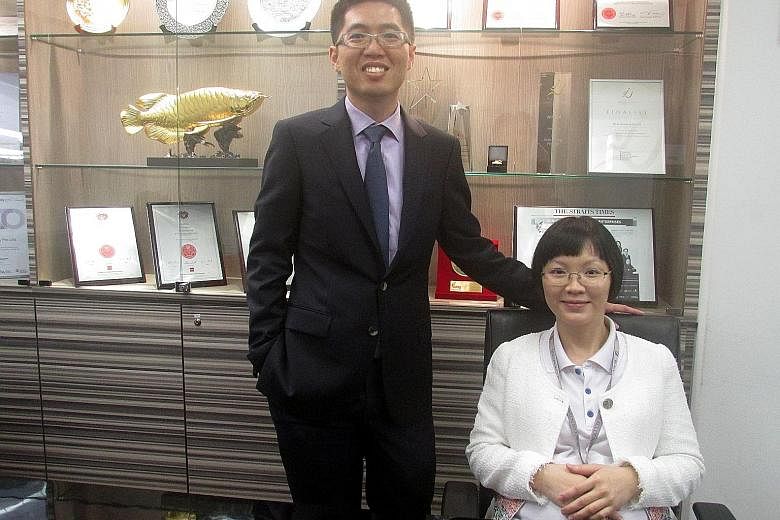Q What was the idea behind 3E Accounting?
A Life at audit firms is all work and long hours. We should know because both my wife Stephanie Chua, 32, and I worked at an audit firm. I came to Singapore in 2008 from Malaysia (I am now a Singapore citizen) and, for the next three years, worked long hours at the firm. It is a very common practice in the industry and is essential as well.
When Stephanie (who is also from Malaysia, but now a permanent resident here) got pregnant, however, we realised that this life cannot continue. We wanted to spend more time as a family, rather than keep working day and night. No other job was providing work-life balance.
So we quit our jobs and decided to start something small of our own.
We started our firm in 2011 with the basic aim of maintaining a healthy work-life balance, while at the same time providing good service to clients.
Once we started operations, we realised that clients desired more than just auditing from our firm. They needed good advice and faster service at a reasonable cost.
That is how the philosophy behind 3E took shape. The three Es in our company name stand for efficient, economical and effective service.
Q How was the client response?
A At first, we faced difficulties like any other fledgling company. Clients were few.
We had to market ourselves through fliers, online advertising, classified websites and so on. Friends and family helped too.
Once customers saw the benefits of having at a decent price accountants certified by the Association of Chartered Certified Accountants, they came in good numbers.
As our customer list grew, our home base was inadequate, so we took on office space in Novena.
Q How did 3E branch out from auditing to accounting?
A Most of our clients are SMEs - numbering nearly 1,800 - who were happy with our work and started requesting we do more for them.
Some wanted us to take up their firm's accounting, others wanted help with taxation.
Overseas clients wanting to set up a base in Singapore also asked us to help with work-pass applications.
Initially, we brought in independent experts to help our clients. Then we decided to do this ourselves.
We studied the various requirements needed and got all the licences. We diversified into providing accounting, secretarial and taxation services, human resource services, business set-up and advisory services, immigration/work-pass services and so on.
We are a one-stop solution for SMEs. We have also had a branch in Malaysia since 2014.
Q How did 3E Accounting International Network take shape?
A We started studying market conditions in China, India and Australia last year after a lot of customers inquired if we had branches in those countries. This demand led to the idea of starting a network of companies which share similar values and work cultures as ours.
So, we started researching and vetting prospective companies which are also one-stop accounting solution providers like us. Things started to move and 3E Accounting International Network was born. We now have 38 offices in 27 countries, with 600 staff as part of our independent network in Asia, the Americas, Europe, Oceania and Africa. Our target is 50 countries by next year.
Q How has this expansion affected your original goal of finding work-life balance?
A We started small and grew quickly, and now have more responsibilities. But we still promote work-life balance, which is significant for acquisition and retention of talent.
We allow flexibility when it comes to office hours, which helps our staff, especially working mothers who need support.
Staff can come in any time between 8am and 10am for their eight-hour workday. If they work longer, they get to accumulate time in the "time bank", which can be reclaimed later for emergencies or a day's leave.
As a result, morale is high and more staff willingly back up one another, building a stronger work culture. Our staff turnover is also very low; some of our first employees are still with us. Seldom have there been resignations.
We also do anonymous employee satisfaction surveys to find out the grievances and needs of our staff.
We were among the winners of last year's Exemplary Employer Award organised by the Tripartite Alliance for Fair and Progressive Employment Practices (Tafep).
Q What is your staff make-up?
A We have 25 people working for us in Singapore - all citizens and permanent residents - while the staff strength in Malaysia is 15.
More than 80 per cent of our local workforce are women, which is not so common in the accounting industry. Our work-life balance policy is the main reason for the greater representation of females in our workforce here.
There were four pregnant employees last year, including my wife, who is expecting our second child.
Together, they comprised more than 10 per cent of our total workforce back then. Now, two of them are on maternity leave.
Q Is work affected as a result?
A We still manage to handle the workload by using technology, like cloud-based services, which enable our employees to access our services from anywhere they wish.
Each employee is trusted to play his part in the company, which evenly divides the workload.
We are also planning to invest in artificial intelligence at some point in the future. We could begin with information tailor-made to answer customer queries, where standard questions are replied through automation.
We also plan to automate our customer-relationship management system, which will help send reminders to customers, among other things. This will save us time and free us up to concentrate on other matters.
Apart from that, the family-oriented culture in the company allows peers to back one another up when necessary, as we believe everyone needs help from time to time.
Q What other policies do you have in place for the staff?
A We try and accommodate staff needs as much as possible. Most of our profits are used for staff welfare.
For example, there were complaints that 14 days of annual leave were not enough. So we put a progressive policy in place which increases the number of annual leave days for employees, depending on their level of service.
A director-level employee, for instance, will get more annual leave than the rest, but it must be noted that the employee put in many long hours of hard work over the years to reach that position.
The maximum is 32 days.
We also make an extra effort in approving paternity leave. We believe fathers also play a big role in the bringing up of children, so we increased paternity leave from the standard two weeks to three weeks.
Maternity leave is the standard four months, but we provide flexibility in the claiming of the leave.
Q What is your advice to firms in this tough economic environment?
A An economic slowdown should not be seen as a hindrance to good human resource policies.
The hard times can be used positively by employers and employees to come up with ideas on how to grow their business. Use the time to innovate.
I have shared our work-life balance policy on many occasions at various talks to encourage more firms to embrace it. My advice is that it is possible to achieve the right balance if extra time and effort are put in.
The employer mindset will still need time to change, but when the younger generation takes up leadership roles, things will change.


